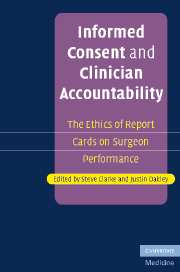Book contents
- Frontmatter
- Contents
- List of contributors
- Acknowledgements
- Introduction: Accountability, informed consent and clinician performance information
- Part I Accountability
- Part II Informed consent
- Part introduction
- 7 Informed consent and surgeons' performance
- 8 The value and practical limits of informed consent
- 9 Against the informed consent argument for surgeon report cards
- 10 Trust and the limits of knowledge
- 11 Surgeons' report cards, heuristics, biases and informed consent
- 12 Report cards, informed consent and market forces
- Part III Reporting performance information
- Index
- References
10 - Trust and the limits of knowledge
Published online by Cambridge University Press: 08 August 2009
- Frontmatter
- Contents
- List of contributors
- Acknowledgements
- Introduction: Accountability, informed consent and clinician performance information
- Part I Accountability
- Part II Informed consent
- Part introduction
- 7 Informed consent and surgeons' performance
- 8 The value and practical limits of informed consent
- 9 Against the informed consent argument for surgeon report cards
- 10 Trust and the limits of knowledge
- 11 Surgeons' report cards, heuristics, biases and informed consent
- 12 Report cards, informed consent and market forces
- Part III Reporting performance information
- Index
- References
Summary
I would be true, for there are those who trust me.
Howard Arnold Walter, 1906The old song by Walter implies that, if we are trusted, we will feel the need to take up some personal obligation to those who trust us. This is interesting, as it suggests that trust is not merely a device for cementing some certainty and commitment in relationships, but imposes an obligation on the trustee that goes to the core of his character. If surgeons are to be trusted to look after the interests of their patients, does this mean that they can also be expected to develop a corresponding sense of duty that is an integral part of the way they see themselves? It would be good if this were so. This chapter examines the effect that trust, or lack of it, may have on surgeons and how it can influence the way they behave. The use of report cards may increase the knowledge we have about particular surgeons, but how does the revelation and application of that knowledge affect surgeons and their relationship with patients?
Difficulties interpreting information
In many situations in life we have to make decisions where we would like to have more or a deeper understanding of the information that is available. We may not be able to access what we need to know or this is couched in terms we do not understand.
- Type
- Chapter
- Information
- Informed Consent and Clinician AccountabilityThe Ethics of Report Cards on Surgeon Performance, pp. 157 - 166Publisher: Cambridge University PressPrint publication year: 2007
References
- 1
- Cited by



